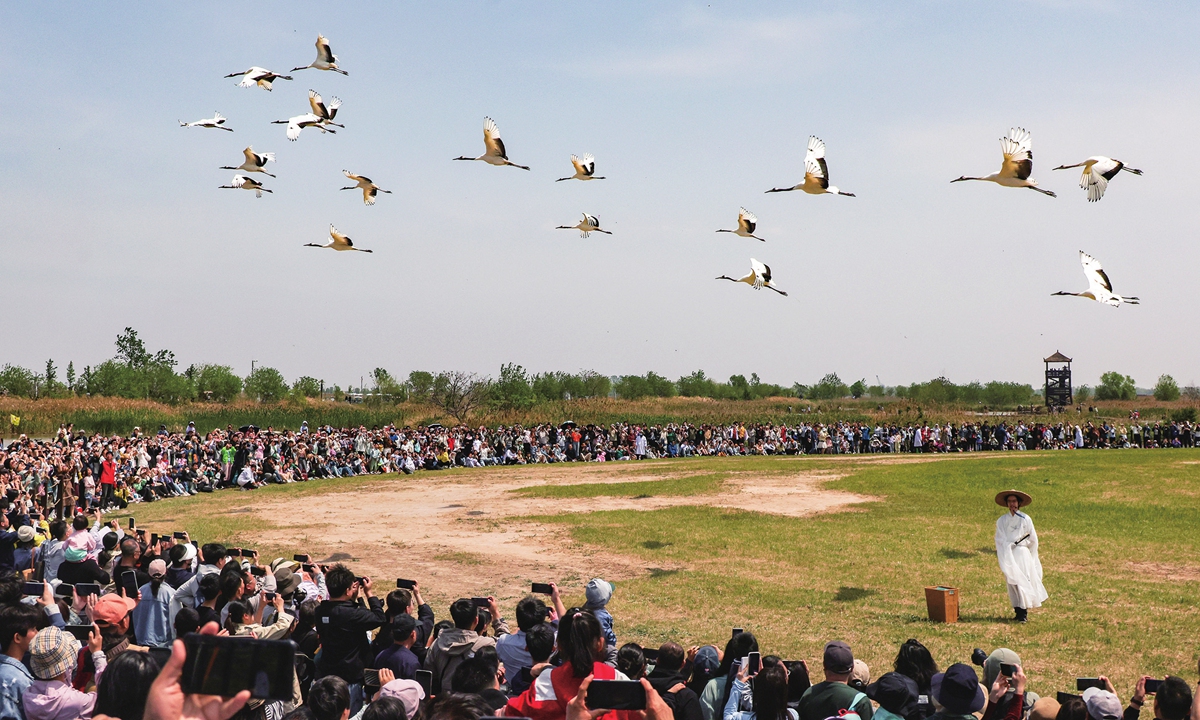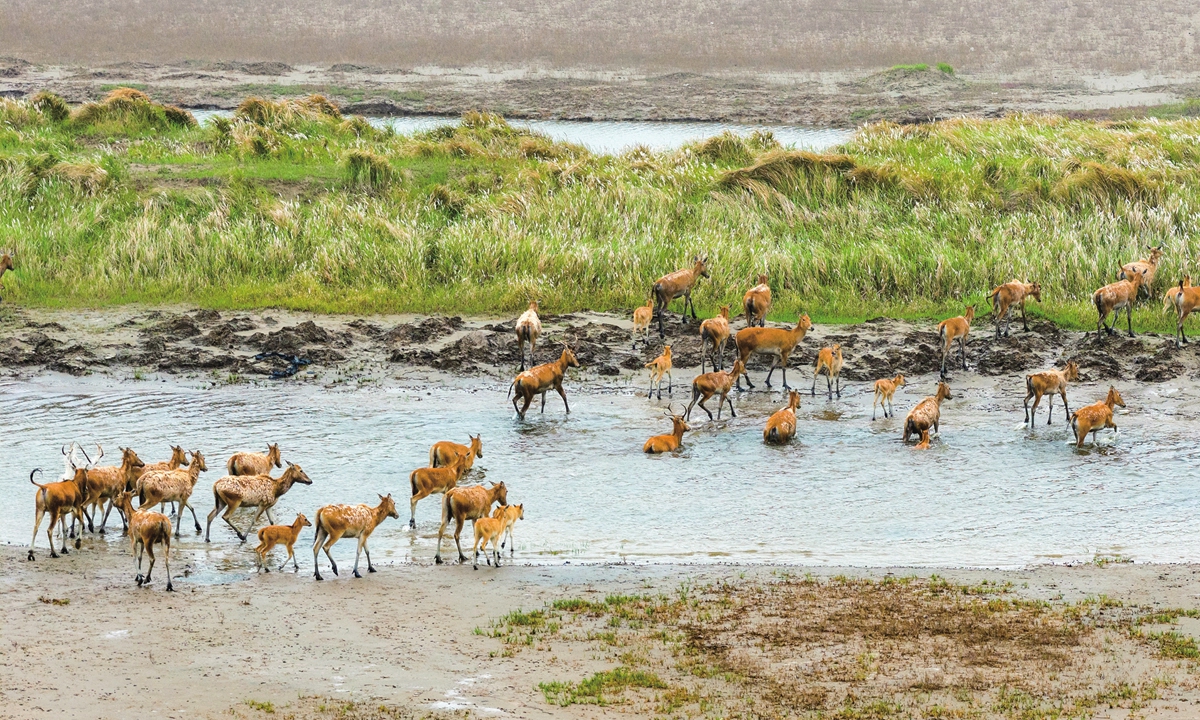ARTS / CULTURE & LEISURE
Yancheng: A hidden gem of salt, soccer and wetlands
Surprising wonder

An aerial view of the Red-crowned Crane Wetland Ecological Tourism Area in Yancheng, East China's Jiangsu Province, on May 3, 2025 Photos: VCG
The Jiangsu Football City League has become a sport and cultural phenomenon, affectionately nicknamed Suchao (Super League of Jiangsu) by Chinese fans.June 28 saw the Yancheng team securing a thrilling 2-0 victory over the Zhenjiang team, propelling the Jiangsu FCL to the top of the league table. The league now features 13 teams, each representing a prefecture-level city in Jiangsu Province, East China.
As cheers from the stadium pierced through the night sky over the Yellow Sea coast, and fans dispersed, holding steaming savory egg pancakes, many found themselves seeing Yancheng in a new light.
This lesser-known city in Jiangsu defies expectations: though not a typical tourist destination, yet it has been honored with UNESCO's prestigious "World Natural Heritage's designation. Like a treasure chest brimming with surprises, Yancheng beckons quietly for rediscovery.
After a four-hour bullet train ride from Beijing, I arrived at the city of Yancheng (literally means city of salt). Nestled in the northern basin of Jiangsu Province, it is the only one city in Chinese mainland without a mountain.
In the name of salt
Being a history buff, I kicked off my exploration at the Yancheng Sea Salt Museum. Stepping inside was like opening a heavy volume of maritime salt lore.
The museum's striking architecture, featuring crystalline forms that remind of the salt clusters along the Chuancang River, shimmered brilliantly in the sunlight.
The exhibits brought the story of salt production to life, tracing its journey from ancient "boiling seawater" methods to sophisticated "solar evaporation" techniques. Rust-covered tools seemed to hum with the songs of past laborers.
Yancheng's identity is deeply tied to salt - it was born from it and flourished because of it.
This ancient thriving industry left behind a heritage of charming towns and streets, offering a glimpse into a time when salt determined the city's fate.

Tianxianyuan Photo: Tianxianyuan scenic spot
Yancheng's legacy also adds flavor to the local culture and traditions. A one-hour train ride took me to the Tianxianyuan scenic spot in Dongtai, where I caught a live performance of the Legend of Dong Yong - a timeless love story between a goddess and a mortal, recognized as China's intangible cultural heritage in 2006.According to the story, the Jade Emperor of Heaven had seven daughters, the youngest of them, the 7th Fairy Maiden, daringly flees down to the human world to help a poor farmer, Dong Yong, an honest and kind-hearted peasant.
The two fall in love and get married, in defiance of the Jade Emperor, who breaks up the happy couple.
The Tianxianyuan show opened with a captivating display of salt production rituals: crystalizing salt panning and brine refining into a mesmerizing artistic tableau.
The performance artfully wove the lovers' story into Dongtai's saltwork traditions - heroic salt artisans battling corrupt merchants.
The drama revealed the unique rhythms of the region's maritime salt culture. Dongtai still claims Dong Yong as its own, with landmarks like Dongjiaduo village, said to be his birthplace, and the Dongyong Temple built in his honor.

Hundreds of elk forage, play and run on the grassland and lakeside in the Tiaozini wetland in Dongtai of Yancheng City, East China's Jiangsu Province, on May 22, 2025.
Wetland wondersIn 2019, China's Migratory Bird Sanctuaries along the Yellow Sea-Bohai Gulf earned a spot on UNESCO's World Heritage List, shining a spotlight on Yancheng's wetlands.
These sanctuaries, part of the world's largest continuous mudflat seashore, are a biodiversity haven, home to 280 fish species and over 500 invertebrates.
They form a vital stopover for millions of migratory birds along the East Asian-Australasian Flyway, the most threatened migratory route globally.
Two standout destinations are the Dafeng Milu National Nature Reserve and the Yancheng Wetland and Rare Birds National Nature Reserve, where elks, egrets, and wild birds thrive. But it was the Tiaozini Wetland in Dongtai that stole my breath. Part of the UNESCO site, its tidal flats shift colors with each tide - nature's own kaleidoscope.
The pristine beauty and vibrant ecosystem make it a critical refuge for migratory birds and a feast for the senses.
Soul of Yancheng
If nature is Yancheng's backbone, its cuisine is its heartbeat. Egg pancakes must be one of the most well-known snacks in the city.
Following the irresistible scent of egg pancakes - crisp outside, tender inside, flecked with scallions, you won't miss them through the streets.
At a lively teahouse, I tried crab roe soup dumplings, their thin skins giving way to a burst of rich, briny goodness. A local grinned as I marveled at the flavor, sharing a quick tip: "Dip them in vinegar first."
Later, as I wandered through the Holland Flower Sea, a tulip-filled oasis free for Suchao ticket holders, I reflected on the various ways Yancheng blends history and nature, tradition and modernity, with effortless charm. With romance woven into its fabric, Yancheng is a city that lingers in your memory long after you've left.


